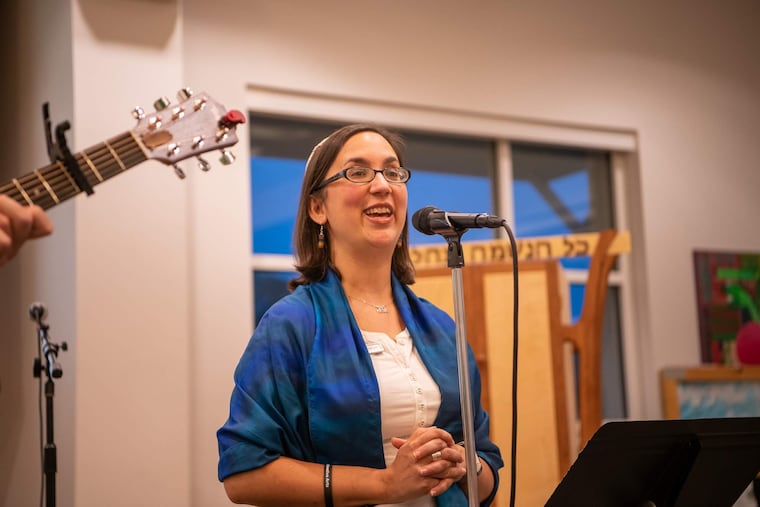I’m a rabbi and I believe religion should have no say in reproductive health laws | Opinion
Two new pieces of legislation would keep personal and medical decisions where they belong: in the hands of pregnant people and their providers.

As a rabbi, I have the privilege of bearing witness to some of the most intimate moments in people’s lives. I stand beside them under the marriage canopy and sit by their hospital beds. I know their day-to-day dramas and the difficult decisions they face. And one of the most important, challenging, and personal of these decisions is when — and how — to build one’s family.
These decisions can lead to immeasurable joy. One of the best parts of being a rabbi is blessing children as infants and then watching them grow into adulthood. But I have also watched individuals and families struggle with infertility, complicated pregnancies, and pregnancy loss. I’ve prayed for individuals and couples undergoing IVF and surrogacy. I’ve sat in perinatal loss support groups, listening to stories of miscarriages and stillbirths, crib deaths and cord accidents. I’ve supported those seeking mourning rituals following the termination of a much-wanted pregnancy.
The paths that people take to parenthood can be complicated and filled with risk. The reasons for not wanting to be pregnant, or to grow one’s family, are just as complex and varied. To place the power to make decisions about reproductive health in the hands of anyone but a pregnant person and their medical provider can cause nothing but harm.
Moreover, it imposes the religious views of a small subset of our population onto the nation at large, a nation that has long enshrined into law the separation of church and state.
I want to make it clear that, as a faith leader, these antichoice politicians and advocates do not speak for me, or for the faith community I serve.
Religion should have no say in reproductive health laws. That’s why I’m supporting two essential pieces of legislation that would ensure health coverage for women seeking abortions and protect them from political interference.
Reproductive rights continue to be under attack in the United States. States pose challenges directly to Roe v. Wade through abortion bans and “heartbeat bills,” such as a new Texas law that prohibits abortions after an embryonic “heartbeat” appears, which can happen before many women know they are pregnant. Nearly half of states are poised to prohibit abortion should the Supreme Court weaken or overturn Roe v. Wade. Given the conservative majority in the court and its recent decision to hear arguments about whether states can prohibit abortions in the earliest stages of pregnancy, when the fetus is not yet viable, the end of Roe is a real possibility.
Already, abortion is inaccessible in many communities. Lawmakers impose medically unnecessary requirements on providers and patients, forcing those seeking an abortion to jump over the hurdles of mandatory counseling and waiting periods if they can even access an open clinic in the first place. The goal of these restrictions is not to protect the health of women and children. If that were the case, lawmakers would ensure that every person in this country has access to affordable and quality reproductive health care.
There are many political leaders who claim that their opposition to reproductive health care is rooted in their faith. But no fewer than 36 times in the Torah, our tradition calls on us to protect the vulnerable: the widow, the orphan, the stranger, and the poor. Restrictions on reproductive health care disproportionately impact our own most vulnerable populations: Black and brown people, Indigenous people, immigrants, young people, the poor, and LGBTQ individuals.
That is why we must call upon our representatives to support two essential pieces of legislation.
The Women’s Health Protection Act (HR 2975/S 1645) would safeguard access to high-quality reproductive health care and protect both patients and providers from political interference. The Equal Access to Abortion Coverage in Health Insurance (EACH) Act would ensure health coverage for abortion, regardless of a person’s income or type of insurance. The EACH Act was introduced in Congress in March; the Women’s Health Protection Act is going to be reintroduced this session of Congress, as well.
I urge people of faith, and all people of conscience, to speak up. Join me in calling on Sens. Pat Toomey and Bob Casey to ensure that personal reproductive decisions remain personal.
Rabbi Leah R. Berkowitz is the spiritual leader of Congregation Kol Ami in Elkins Park, the copresident of the Women’s Rabbinic Network, and a participant in the National Council of Jewish Women’s Rabbi for Repro campaign.